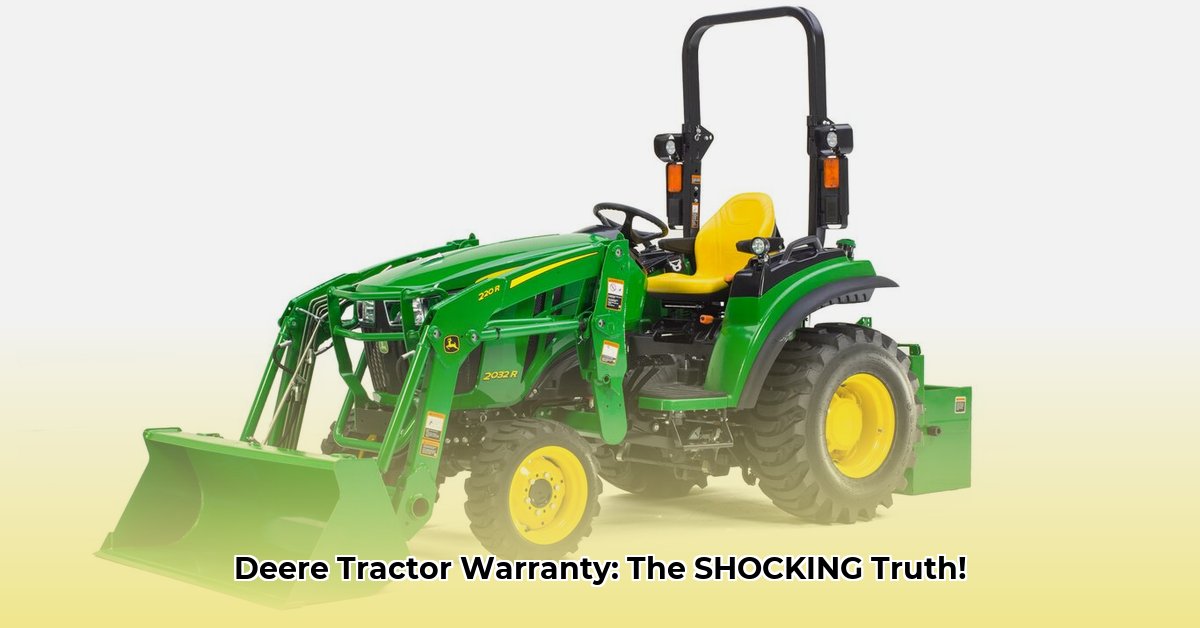
Choosing the right warranty for your John Deere tractor is a crucial decision impacting both your financial stability and your commitment to sustainable farming practices. This guide will help you navigate the complexities of John Deere's warranty options, empowering you to make an informed choice. For more information on tractor specifications, check out these helpful resources.
Decoding Deere's Warranty Options: Standard vs. Extended Coverage
Every new John Deere tractor includes a standard warranty covering manufacturing defects for a limited period (typically one to two years). This covers faulty parts or workmanship issues arising early in the tractor's life. However, unexpected repairs after this initial period can be substantial. This is where an extended warranty provides crucial protection.
Extended warranties extend coverage beyond the standard period, often for three to five years or longer, depending on the specific plan. They typically cover a broader range of components, potentially including major systems like the engine or transmission.
Here's a direct comparison:
| Feature | Standard Warranty | Extended Warranty |
|---|---|---|
| Coverage Duration | 1-2 years (typically) | 3-5 years (or more, depending on the plan) |
| Coverage | Manufacturing defects in materials and workmanship | Broader coverage, often including major components |
| Cost | Included in purchase price | Additional purchase required |
Weighing Your Options: Is Extended Coverage Right for You?
The decision to purchase an extended warranty depends on several factors:
- Budget: Can you comfortably afford the additional cost? Factor this into your overall farm budget.
- Usage: Do you operate your tractor intensively, daily, or only occasionally? High usage increases the potential for repairs.
- Tractor Value: A more expensive tractor warrants greater consideration of extended warranty protection due to higher potential repair costs.
- Risk Tolerance: Are you comfortable shouldering the risk of significant repair bills, or do you prefer the peace of mind of extended coverage?
Consider this: a farmer using a high-value tractor daily for intensive work might find an extended warranty indispensable. Conversely, a farmer using an older, less expensive tractor sporadically might find the added expense less necessary.
The Sustainability Angle: A Longer Life, But What Are the Tradeoffs?
Extending a tractor's lifespan seems environmentally sound – less waste and resource consumption. However, it's a nuanced issue. While prolonged use reduces the need for replacement, it might delay adoption of newer, more fuel-efficient models. The long-term environmental impact remains a subject of ongoing research and discussion. Some experts highlight potential drawbacks, such as the continued use of less efficient technology. Others argue that maximizing the lifespan of existing equipment reduces overall resource consumption.
Making the Most of Your John Deere Tractor Warranty
To maximize the benefits of your warranty, regardless of length:
- Register Your Tractor Immediately: Failure to register invalidates your warranty coverage.
- Review the Warranty Document Carefully: Understand precisely what is and isn't covered.
- Maintain Detailed Records: Keep meticulous records of all maintenance and repairs. This is essential for warranty claims.
- Prioritize Regular Maintenance: Proactive maintenance prevents issues and extends your tractor's lifespan.
- Familiarize Yourself with the Claims Process: This ensures smooth claim processing should a problem arise.
How Does John Deere's Extended Warranty Impact Sustainable Farming Practices?
Extended warranties offer significant benefits to sustainable farming:
- Reduced Downtime: Unexpected repairs disrupt operations, especially during critical periods. Extended warranties minimize downtime, ensuring consistent productivity for your sustainable practices.
- Financial Stability: Predictable repair costs allow you to budget for other sustainable investments, such as fuel-efficient equipment or renewable energy sources.
- Technological Advancements: Warranties can encourage adoption of newer, more sustainable models with enhanced features like improved fuel economy and reduced emissions.
By carefully weighing the financial, operational, and environmental considerations, you can select the warranty that best supports your goals for responsible and profitable farming. Remember, the choice is not merely a financial one; it's an integral part of your farm's long-term sustainability plan.